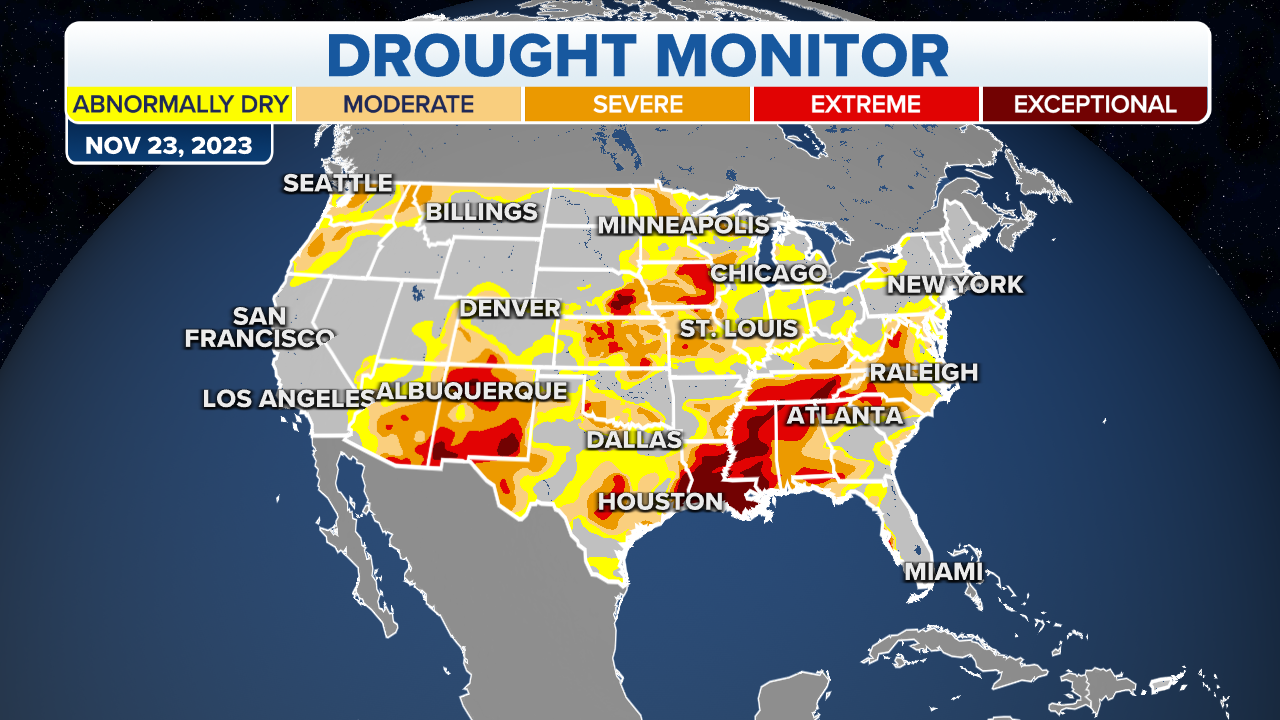Hellish heat wave searing US likely to drag on for weeks
In addition to the dangerous heat, drought conditions are also expanding as the scorching temperatures strip the ground of moisture. Various heat alerts are in effect for millions of people across the U.S. this week.
Dangerous heat grows across the US
Record high temperatures have been reported across the South as dangerous heat is expected to continue for the foreseeable future from the Southwest to the Southeast.
The FOX Forecast Center warns weather patterns that have resulted in excessive heat across large parts of the western and southern U.S. will continue through the foreseeable future with increasing fire risks and drought conditions.
Computer forecast models show areas of high pressure will likely set up shop over large parts of the Southwest and the Gulf Coast for the remainder of July. When these weather patterns are in place, warm air is usually trapped, leading to the formation of heat waves that can send temperatures soaring into the 90s and 100s.
Feels-like temperatures, or how warm the body thinks the air is when humidity and other factors are taken into account, have already ventured into the 110- to 120-degree zone during the heat wave.

Heat wave pattern impacting the U.S.
(FOX Weather)
Extreme heat has caused El Paso, Texas, to experience a month of nonstop triple-digit heat, and Phoenix has seen temperatures reach at least 110 degrees for more than two weeks.
In Florida, the first-ever Excessive Heat Warning was issued for Miami on Sunday.
On Monday, Heat Advisories are in effect for nearly 49 million people in the U.S., with more than 34 million under Excessive Heat Warnings, including in Central Texas, southern Arizona, Nevada and throughout California.
Heat Advisories are in place for South and Southwest Florida through Tuesday. In the afternoon, heat indices could approach 110 degrees in parts of southern Florida.

Florida Heat Advisories through Tuesday night.
(FOX Weather)
This week will be much of the same for the Southwest.
A stationary upper-level high will remain in place over the Southwest, sending temperatures into potentially record territory.
Heat Advisories throughout the Southwest and South remain in effect through Tuesday night.

(FOX Weather)
On Monday, nearly two dozen record-high temperatures are at risk of being broken. Over the next week, more than 27 million people in the Lower 48 will experience air temperatures or feels-like temperatures above 110 degrees, according to the FOX Forecast Center.
Preventing heat exhaustion and heat stroke
Dr. Richard Bradley, an emergency medical services physician, discusses best practices to prevent heat exhaustion and heat stroke.
The heat is not only uncomfortable, but it can also be hazardous to health, and authorities said they’ve responded to hundreds of calls of heat-related illnesses. Several people have died because of heat this summer.
COUNTRY STAR JASON ALDEAN SAYS HE SUFFERED HEAT EXHAUSTION DURING CONNECTICUT CONCERT
July is typically the warmest month of the year, but temperatures have regularly reached between 5 and 15 degrees above average for many places this month.
Not just hot
The pattern has also resulted in little precipitation for many regions of Texas and a monsoon season that has been virtually nonexistent in the Desert Southwest.
Continued hot and dry weather will result in the loss of soil moisture and continued drying out of vegetation.
Parts of the Golden State are included in the increasing fire risk, with multiple large fires that have broken out.
RABBIT FIRE IN SOUTHERN CALIFORNIA FORCES DOZENS OF EVACUATIONS, BURNS OVER 7,000 ACRES IN HOURS
The fire season in California got off to a slow start due to a deluge of precipitation from atmospheric river events during the winter and early spring.
Data from the National Drought Mitigation Center shows drought conditions expanding by about 2% every week.

A broken record
If the phrase "record heat" is beginning to sound like a broken record, that's because it is.
While there is still a month and a half to go of summer, the country is on track to see another season rank in the top half of warmest ever.
HEAT KILLS MORE AMERICANS THAN FLOODING, TORNADOES, HURRICANES OR LIGHTNING
NOAA reported June’s average temperature was 0.5 degrees above average, which ranked in the middle of records set over 129 years.
Once July concludes, the agency will calculate the average temperature over the 31 days, and the summer will officially be two-thirds in the history books.
The summers of 2022, 2021, 2012, 2011 and 1936 hold the top five spots for warmest seasons ever, with the average temperature ranging between 2 and 3 degrees above average.



